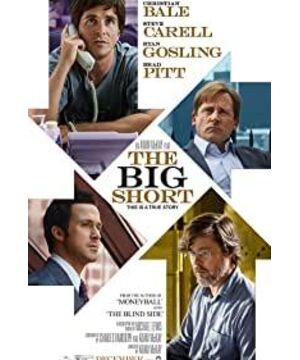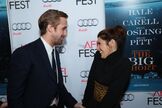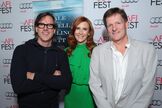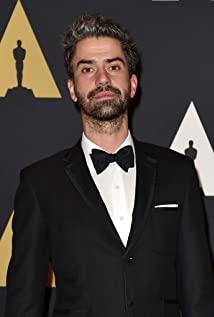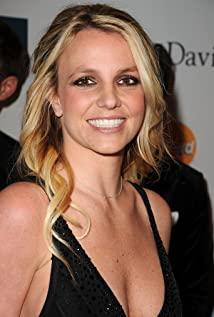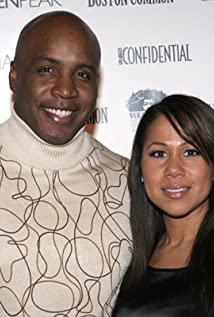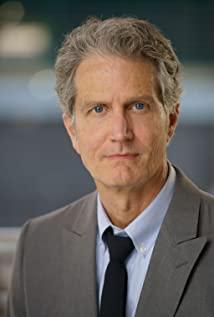In the beginning of 2016, let's talk about the economic crisis! Hahaha, I think this beginning is really boring and boring, but fortunately, the movie "Big Short" gives us a completely different feeling. Such a film derived from the work of the same name by the famous American financial journalist: Michael Lewis, at the beginning of the adaptation, when the author heard the news, he didn't care at all. In a roundtable interview with the Hollywood Reporter, he said: "When I was writing, I felt that this work could not be put on the big screen.".
Despite what Michael Lewis said, two of his previous works have been adapted into movies. They are: "Weakness" in 2009, which tells the story of a legendary rugby player, and "Penalty Kick" in 2011, which tells a story. Legendary baseball team manager. The behind-the-scenes man who put this "Penalty Kick" on the big screen was the discerning Mr. Brad Pitt, who also played the leading role. And he also stated precisely: "The story of "Big Short" needs to be told, and the current situation and the subprime mortgage crisis have not changed in the slightest." Here again, I admire Mr. Pete’s vision of the film selection. In addition to Paramount, this "Big Short" is also co-produced by his production company PLAN B. The difference this time is that the book "Big Short" published in 2011 tells the story of the subprime mortgage crisis in the United States between 2005 and 2008, which was pre-detected by a few Wall Street talents and resisted the pressure, betting on the economy, and avoiding This is different from the author’s previous characters and sports themes. Since 2008, self-censored economic films have rarely been successful. If the 2011 "Storm of Benefits" counts as one, then we have not yet seen more possibilities. On the one hand, the painful past can hardly bear to look back, just like about 9. Movies with 11 themes will always be considered carefully. On the other hand, this kind of film has a very limited audience. Except for some related practitioners, most of the audience cannot get the stimulation and pressure. They will only become "The Wolf of Wall Street", the extravagance of money and speeches. . And the director of this film: Adam McKay, as a screenwriter and production of light comedies, he saw the topics worth discussing, the meaning of the true story, and the interesting parts of the author's book. In an interview with the creator, when the host said that this movie is really interesting, the director looked at the author with joy and said, fortunately, the word "Fun" was not spoken from my mouth. And Michael Lewis generously admitted that the adaptation of the film has nothing to do with him, because the novel and the film are completely different, but I am very happy that the director can successfully adapt the film into a film. There are indeed many humorous sections in the story, and the film is also After reaching the concise and concise, the effect of making people laugh, he fell into contemplation again. Regarding the fluid language of the lens, I watched this 130-minute movie in the theater and almost fainted Xiao Xuan'er who hadn’t had lunch. At about 110 minutes, the long-lost motion sickness came, because the lens was too bad. Shook. Not only in previous movies, part of the plot uses the lens language of out-of-focus and hand-held shaking. It's a close-up of people from beginning to end, panning, stretching, and refocusing. From the beginning of the 70s retrospective, to the return to reality in 2005, and the subsequent development of the story, a large number of subjective lens language, that is, the first-person perspective, is used to look at the character, focus on the line of sight, zoom in on the close-up, and then pull. The process of opening close shots. In the group play, the camera is hidden in the corner to observe, the characters move naturally in the scene, and the camera moves to shoot everyone's behavior and expressions. Christian Bale, who performed most of the one-man roles in the film, said in an interview that the filming process felt like being locked in a cabin by the director, trying to perform various performances. The director was hiding behind the camera, giving orders, and then another one. Or something like that. In the film, a full display of this hedge fund manager: Michael Berry’s bridge segment is basically in his closed small office, interviewing, consulting information, looking through data, brushing teeth, exercising, and calling The boss, debating with the top, etc. etc. In addition, he often looks at the camera and the audience. Although he is a character who has a strong sense of alienation from the surrounding environment and colleagues, it gives the audience a direct sense of communication. Among them, Ryan Gosling, who plays Jared Venett, said that this is the first time he has tried such a way of acting. For example, he asked Mark Baum’s company The scene in the meeting room when the staff proposed. The camera is placed in the corner of the room, and the actors only need to enter the stage, which is the conference room, and perform coherent performances and narrations, without worrying about the shooting of the camera or seeing where the camera is. The eyes, language, and movement exchanges of the two parties were all silently filmed. There is a documentary effect of restoring the scene. The dramatic conflict between the two parties can be objectively displayed instead of a speech-style preaching, and for the sake of creating drama. Arguing, they are just talking about the market and discussing how to make money, and each party is fighting for reasons. The director uses this lens language to set the tone of the film. It is not the development of a story like a traditional feature film, nor a pure documentary. Instead, it turns the real life and facts of this economic theme into a multi-angle interpretation, Ryan ·Gosling’s voice-over commentary from the beginning to the end, the narration of each character suddenly looking back, and the dialogue between the characters promote the continuous evolution of the crisis on the timeline. Some people say that this is a magical narration that broke the fourth wall. The way, it makes people feel that the next second in the director's lens, the cards are never played according to common sense, especially in the two wonderful scenes, the two characters yelled at each other in the air. And Adam McKay said in the interview that his original intention and purpose for making the film was very simple: to let people talk about it after watching the movie, and to say something about the economic crisis they experienced personally. what. The clever interweaving of materials is believed to be an opportunity not too soon for most people for such a film to appear at this time in less than ten years after the subprime mortgage crisis. The director’s documentary style, breaking the traditional narrative form, constantly interspersed with celebrity commentary, and figurative portrayal of inner drama, do everything in his power to transform obscure economic issues into interesting concepts and popularize them, making boring explanations novel. Instead, the blonde beauty in the bathtub talks about subprime loans, the chef explains the composition of MBS, economists and pop singers mix and match, and analyzes the pretense terms of those evil professionals, making people no longer doubt their IQ. And using the pop culture picture to dismantle and show the inner joy of the characters, the madness of the bank clerk selling 600 million US dollars of CDS, the kind of smell of money, the feeling of seeing money down from the sky, picking up the feeling of softness. There is also the grassroots duo: Jamie and Charlie, the mood when they picked up and read Michael Bray's file, like beautiful music echoed in their ears. All of this is too imagery, it's so exciting, it's unstoppable, even if Margot Robbie in the bath Fuck Off to me several times, I want to hear her explain it again. The wonderful story about portraits of characters lies in the author’s discovery of real characters’ stories and wonderful ways of telling them. The film uses a straightforward way to portray these three waves of characters: 1. Hedge fund company manager: Michael · Berry, he first discovered the problem, but he has been Alexander, because once the company did not wait for the real estate economy to collapse and was dragged down by long-term insurance premiums, he would be ruined. He is isolated from the crowd, has a calmer perspective and a sense of doing the opposite. He has reasonable doubts about everyone, working and venting under bursting rock music, from +38% to -19. 7%, sticking to +489%, a person and the entire system are dead, he believes in the phrase on the poster: to be the master of his own destiny, the helmsman of the soul, he is a lonely thinker. 2. Jared Venett and Mark Baum’s team, Jared Venett did his own research after hearing that a bank had sold CDS worth 200 million US dollars, joined the ranks surely, and was constantly looking for it. The customer is in danger. After meeting Mark Baum and his team, the team went deep into the front-line market to investigate the monthly housing loan payment, intermediate links, and evaluation agencies. They are the activists. And the very noisy Mark Baum in the film, the typical important things must be said three times for obsessive-compulsive disorder, such as: I love my job, this is my taxi, and I will tell you when it’s time to shoot, etc. . At the end of the film, he became the quietest one, from a person full of antagonism and resentment towards the banking system, to a person extremely sad. The change is so big and moving. Just like the ending caption, his wife said that after the housing market collapsed, he became more gentle. He had no joy in winning, but he couldn't laugh when he made money. 3. Ben Likert and Jamie & Charlie, the grassroots duo was picking it up. To be precise, after learning that a high-ranking person doubted the real estate bubble, he also launched an investigation, and finally found a middleman, helped them buy a large amount of CDS, and strived to save the economy. They are smart speculators in gambling and gaining wealth. However, their cheers were immediately stopped by the predecessor Ben Liker, and should never be excited about the victory of the gambling economy, because it means a disaster for most people. These three groups don’t know each other , But indirectly connected figures have linked the development of the bubble economy and the subprime mortgage crisis in the US real estate since 2005. They happen to be three types of personas: thinkers, actors, and smart speculators. This is why at the beginning of the film, the first entry was Michael Bray, because he is the true source of everything, an observant thinker, he never forgot the Great Depression of the 1930s, and has been questioning the low-risk real estate on the surface. All the way up. In the film, it is necessary to talk about the relationship between CDO debt mortgage bonds, SEC US Securities Regulatory Commission and other positions in the financial environment. The most ingenious one is that Jamie’s sister works in the SEC, but complains about the poor treatment, and turns to pounce. The handsome guy at Goldman Sachs. The film outlines the industry and the Wall Street-related industry chain, including established banks, investment banks, fund companies, rating agencies, and journalists, using facial makeup and representative language to cut into the weakness of the key and the problem. They are unadorned portraits of real people, which constitute the overall financial ecological environment. With regard to the description of anti-heroism, the storyteller is always the scarce genius. The writer and director of this story are rare geniuses who tell stories. When the audience buys movie tickets, put aside all the trivial matters, do it in front of the black movie screen, waiting for the plot to be staged, leaving their brains blank, and they are willing to believe in some of the characters' telling. At this time, smart people will not pretend to be forced, but will use all their best to attract the attention and attention of the audience. This "Big Short" not only did not deliberately create heroes, but only portrayed a few maverick individuals. At the end, Jared Venett said directly that there is no heroic dialogue here. This anti-heroic movie emphasizes once again that in this economic crisis, everyone was the initiator, and there is no winner in the usual sense. The film’s impression is like the crocodile that suddenly appeared in the swimming pool of the deserted house. It was a fright and a surprise. The sense of form is nonsensical, the content is stimulating, and the result is impossible to guess. This is the quotation from the beginning of the film: "It is not ignorance that gets people into trouble, but the seemingly correct fallacy." The financial crisis is very similar to the earthquake and tsunami. It is unavoidable and unpredictable. Even if a few people predict it, everyone does not believe it. Those who believe do not dare to make false statements and can only wait for it to happen. The cycle goes back and forth, the prosperity will decline, this is the law of all things. Maybe everyone is really looking forward to the end of the world deep in their hearts. The film did not do any preaching, but only showed us two different faces, one is arrogant, specifically see banks, CDO managers, credit staff, etc., one is extremely at a loss. Crying without tears, see what the above-mentioned people look like at the podium, office, and talent recruitment market at the end of the film. The director’s goal of making this film was achieved brilliantly. Good-looking first, inspiring second, coupled with the performance of the four big names, let people see what it means to entertain everyone with artistic techniques. Director: Adam McKenzie Kai, really is a master with a knife in a smile. January 4, 2016 Toronto Xiao Xuan Er Ji——————————————————
If you like my article,
Welcome to follow "Xiao Xuan Er's Late Night Chat" on Station B or Youtube
https://space.bilibili.com/1340064530
Update every Friday, currently available to watch
#Japan Movie Master Blu-ray Set Series
#Taiwan Film Master Blu-ray Collection Series
#New and old film mixed cut series
There will be more CC Blu-ray suit series in the future
Thank you for your support! Every one of your attention is precious to me!
View more about
The Big Short reviews


